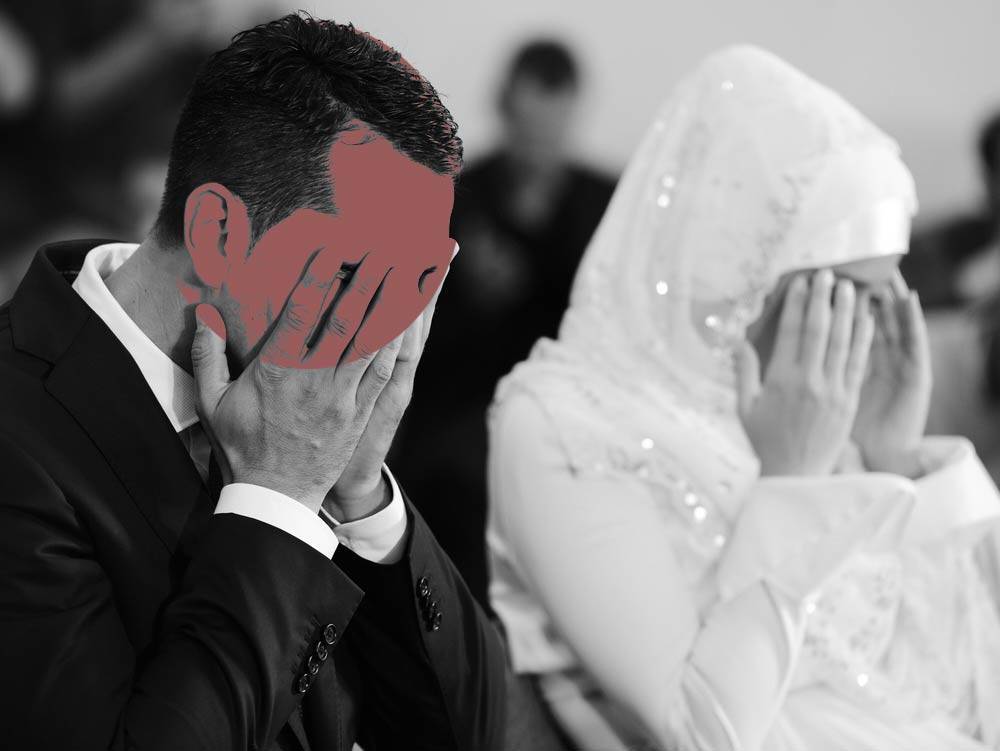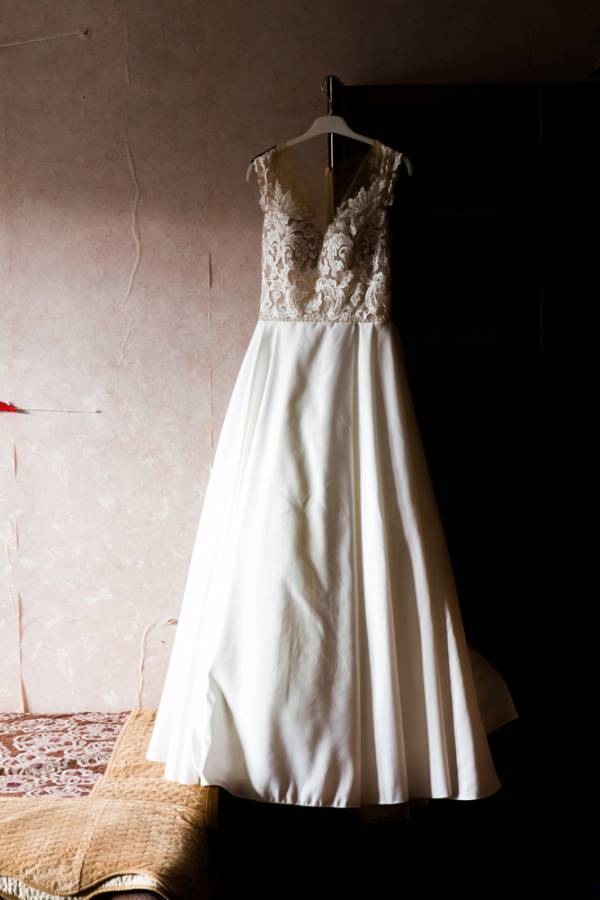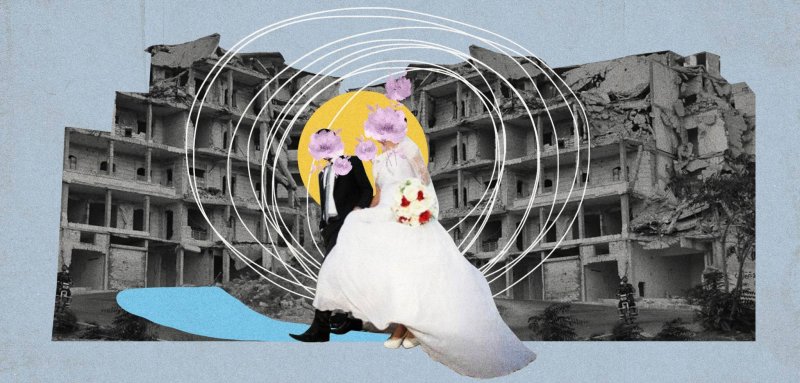Russian, Iranian, Pakistani, Iraqi... A slew of nationalities has invaded the lives of Syrian women, as a result of the diverse pool of imported rifle holders – along with their leaders who support the Syrian regime on Syrian soil – come from.
Along the Syrian coast, the sight of a Russian visiting the market to purchase the needs of his family is no longer an odd one. Meanwhile in the areas under Iranian influence, there aren’t any differences between an Iraqi, Iranian, and Syrian except when it comes to accent and dialect... When these strangers’ stay in the region was extended, it seems that it had become necessary to answer to the demands of the heart – and perhaps instincts as well.
A new “universal” complication has joined the complexities of the “class” differences when it comes to Syrian marriage. Complications such as “son of the Rif (country boy) and city girl”, “Shami (Damascus local) and Diriyah (Deir Al-Zour local)”, “a Syrian local and a displaced Syrian”... What has often tipped the scales towards love and harmony is still present, and its impact has increased in war. A new guest on its long list has just arrived.
Much has been said about jihadist marriages to Syrian women, but the scene has more options now: the marriages of foreign fighters – who came to support the Syrian regime – to Syrians.
Some may think that a groom coming from the rubbles of war offers Syrian girls a new option for a trade-off as well as the ability to determine who would steal her heart. However, the picture is not as it first appears, for these new strange grooms are either a refuge from living below the extreme poverty line, an ‘ambassador’ to reaching countries of safety, or a source of protection for her and her family. Often, she really does not have the option to utter the word “no” in the face of “ally” and “supporter”.
Warrior Knight in Shining Armor
Ilhami S., 27, is an Iranian soldier who came to Syria to fight within the ranks of the Iranian Revolutionary Guard and stayed in Damascus where he works in the field of translation thanks to being fluent in the Persian language. He wanted to marry a Syrian girl, since “Syrian women are known for their skills and their ability to take responsibility,” as he puts it, so he married Zahraa (pseudonym) in the traditional manner.
As he was talking to Raseef22, he was interrupted by Zahraa, 22 – the housewife laughing and saying, “He would see me while he was passing by in our street (Al-Amin neighborhood).”

She describes her marriage as successful and based on understanding, honesty, and trust. She adds, “We do not allow politics and war to interfere in our marriage and our home.” She sees that her marriage is now a normal occurrence as a result of the large number of similar marriages within the environment that she lives in.
A year ago, Ilhami had been planning to stay in Syria, but the current situation and the ongoing difficult living conditions have led him to seriously consider traveling in order to secure a better life. This does not bother Zahraa, nor did the idea of marrying a foreign man disturb her. “The thing that concerns me is granting my children the Syrian nationality,” she says.
Zahraa’s situation is not any different from that of Areej al-Ali, a 24-year-old computer engineering student who married a Pakistani young man. He is a former fighter in the ‘Liwa Zainebiyoun’ (or the Zaynabiyoun Peace Brigade) which fights alongside Iranian forces, and he then went on to work in the Iranian embassy in Damascus. Areej says, “I got to know Ali A. in the Sayyida Zainab region in Damascus, while he was fighting within the ranks of the Iranian Revolutionary Guard. He would come visit me at the university to meet up, and a romantic relationship began to develop between us.”
Less than a year later, Ali proposed to Areej, and the engagement period lasted for about three months. Then they got married, and now they are planning to travel to Pakistan, as soon as her Pakistani husband finds a better job opportunity there. As for Areej, she wants to travel even more than her husband does, because Pakistan opens up broader horizons and fields for her studies.
Speaking of their life together, Areej says: “My life with him is a happy one, and I do not suffer from any negative views of our marriage, especially in the neighborhood we live in [the Imam Zain al-Abidin neighborhood in Damascus]... I am not fearful for my future.” She adds, “Any political or military views or perspectives cannot affect my marriage.”
Foreign Marriages
Commenting on this type of marriage, social researcher Samar Ali tells Raseef22, “We can call it an international marriage. It did and still exists in many countries – as well as during different time periods – and its percentage increases during periods of integration and mingling and during crises and wars.”
She adds, “When it comes to Syrian women marrying foreigners that came to the region during wars, its success and failure are linked to the degree of awareness of the two parties, their intellectual and cultural affinities, and the ability to understand the other, as well as accept cultural differences and different temperaments.”
Some think that a foreign groom coming to Syria to fight will give a Syrian girl new options: This stranger is either her refuge from poverty, her ambassador to safe countries, or her source of protection
She brings back to my mind the instances of marriages that had taken place between Syrians and Iraqis in the past – instances that were both successful and accepted in Syrian society. The same applies for marriage to Jordanians and Palestinians. She says, “Maybe here geography plays a role when it comes to the similarities of some customs and cultures, but in the case of marriage with foreign nationalities, it is more difficult due to various major differences.”
Legally, the issue requires a marriage contract first, then its confirmation in court, but the Sharia court does not validate the marriage until after it has obtained security approval from ‘Branch 300’ – also called the “Counter Espionage Branch” which plays a vital role in monitoring all foreigners that enter Syria – and it takes about one week from date of submission for the approval.
However, some of these marriages are not validated in court at all, thus they only have religious context. One such example is Fatima Haj Ali, a 35-year-old woman residing in Damascus. She’s been married for two years to an Iraqi man that used to be a fighter.
Fatima says: “I met my husband by chance through some relatives, and what was meant to happen, happened and the marriage was a traditional one.” Commenting on the success of her marriage, the young woman – who left the profession of nursing after marriage – adds, “He amicably asked me to leave work, and I agreed. My marriage was successful before the Corona [pandemic], because my husband used to frequent Syria, but after Corona, it became difficult for him to return to us at the same pace, due to the closure of airports and borders.”
Fatima does not suffer from any difficulties when it comes to differences in nationality or dialect, but society’s view of her marriage bothers her. She says, “It is an unfair view. Everyone thinks that I married him motivated by greed. To this day, after all these years, and after the birth of my daughter, I still hear the same rumors all the time, and they bother me greatly because they are absolutely incorrect.”

We Converse through the Language of Love
Apart from factors of temptation – whether external, such as beauty and elegance, or internal, such as behavior and “morals” – there is no doubt that the first and foremost tempting factor for every foreigner that marries a Syrian girl is the low threshold of requirements that she has compared to her counterparts, regardless of their nationality or the region they come from. In addition, most Syrian girls have experienced the conditions of war, and thus are able to withstand difficult circumstances. As a result, many foreign men decided to marry Syrian girls in countries of asylum after the war.
It is an unfair view. Everyone thinks I am a gold digger. To this day, after many years and my daughter’s birth, I still hear the same rumors and they bother me greatly for they are incorrect
This analysis supports the numbers recorded by Syria’s neighboring countries when it comes to marriages between foreigners and Syrians. In Turkey, 6,495 cases of Turkish marriages to Syrian women were registered in 2016 alone. In Lebanon, hundreds of marriages are annually held between Syrian women and Lebanese men, including marriages with minors. The same is the case in Jordan, while Egyptian courts recorded about 12,000 marriages between Egyptians and Syrians in one year, according to a statistic from the National Council for Women in Egypt, denouncing the circumstances of these marriages and the exploitation of refugee women, describing the entire affair as “human trafficking”.
The problem in marrying a foreigner begins when cracks begin to appear between the spouses, due to obvious disparities between their cultures, and that may be reflected on the children.
Social researcher Samar Ali says, “When the parents’ cultures are different from one another, children live in a great psychological struggle, because each of the parents seeks to impose their own culture, customs, and traditions on them, and from here a cultural family dispute arises between the husband and wife, and children are usually the victims.”
This partiality is a major fear factor for Salma A., 31, who hails from the Latakia governorate and lives in Damascus, where she works as a government employee.
Salma married Boris (pseudonym), a civil servant at the Russian Khmeimim Air Base – also Hmeimim Air Base – in Latakia five years ago. She tells Raseef22, “I married Boris two years ago, and I live with him a happy life, but I am afraid of the big gap between our culture and his culture, and dialogue often creates a gap in this same context, but thank God the arguments stay within the context of dialogue and understanding.”
On first getting acquainted, she recounts, “We met by chance. It was a very disorderly meeting on my birthday. I was celebrating with my friends, and when a young Russian man arrived with one of my friends, I got to know him and we began to meet up.”
“The day I was introduced to Salma, I immediately regretted not learning Arabic earlier” Boris says adding: “I loved Salma from the very first moments we met, and we got married quite easily and effortlessly, and any external circumstances related to politics or the like has nothing to do with us.”
Regarding society’s view of them, Salma says, “We turn our backs on everything that is said about our marriage, and do not pay any attention to what we hear in terms of rumors and analyzing.”
The issue of language remains the biggest obstacle between the spouses, “but we overcome it by speaking in English most of the time,” Salma says, touching upon the future of her family, “Syria or Russia… I admit that the place and location is important... It is very critical what we are going through in terms of circumstances, but people are the main factor in every occurrence that comes up, since the main aspects of forming a family are the same in any country.”
Under the Hold of Alliances
“There is no marriage without challenges, but both parties must overcome these challenges together.” This is how social researcher Samar Ali comments on this particular issue, and adds, “In transnational marriages, the danger lies in whether a man thinks that he is better than his wife because of his nationality, or that he thinks that he has pulled her out of her harsh and bitter reality by marrying her. It might even reach the point where it becomes a repeated reminder of this issue by him, and thus the wife will suffer from a constant state of disappointment and anxiety regarding this matter.”
As for the possibility of divorce for reasons related to political disputes and varying alliances, she says, “Although it is an issue that one does not expect to happen – especially after years pass since first getting married – in recent years Sharia courts have registered many divorce cases caused by differences in political opinion, so it is a potential issue and a risk factor that cannot be ignored.”
Studies and statistics say that those born from parents of different nationalities acquire open-mindedness, customs, as well as scientific, linguistic, and cultural richness, since the child acquires intellectual and emotional maturity and social awareness from both parents and on different levels… But will transnational marriages in Syria succeed in securing this particular attribute or feature, even though it is a product of war and its impurities? Will their simple life and contentment protect this family from any attacks concerning pre-existing class differences, political differences, and cultural fractures?
Raseef22 is a not for profit entity. Our focus is on quality journalism. Every contribution to the NasRaseef membership goes directly towards journalism production. We stand independent, not accepting corporate sponsorships, sponsored content or political funding.
Support our mission to keep Raseef22 available to all readers by clicking here!
Interested in writing with us? Check our pitch process here!





